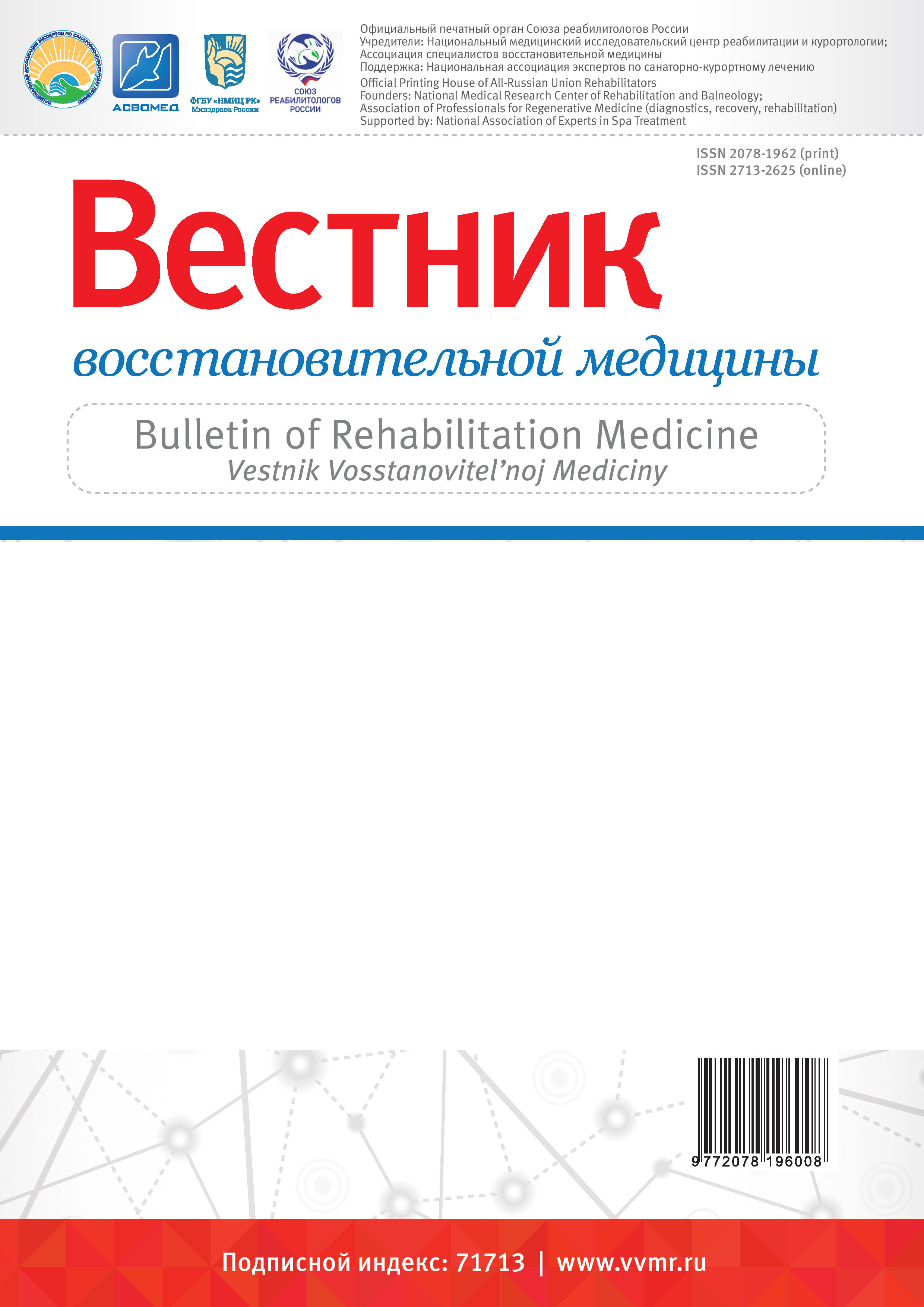Первый Московский государственный медицинский университет им. И.М. Сеченова Минздрава России, Москва, Россия
INTRODUCTION. The prevention, treatment and medical rehabilitation of children with bronchial asthma is an urgent public health issue due to the increasing prevalence of the disease and its more severe course. According to the literature, most children with bronchial asthma have increased meteosensitivity, i.e. reduced resistance of the body to changing meteorological conditions, which is usually accompanied by the development of pathological meteotropic (meteopathic) reactions. Meteoprophylaxis using the method of interval hypoxic training contributes to reduction of frequency and severity of meteopathic reactions, improvement of functional state of respiratory system and psychological status. The positive effect of normobaric hypoxic therapy on clinical and functional parameters in children, including those with bronchial asthma, is known. MATERIAL AND METHODS. We examined 80 children with increased meteosensitivity, the study group consisted of 40 children who received normobaric hypoxic therapy, the comparison group consisted of 40 children who did not receive normobaric hypoxic therapy. The effect of normobaric hypoxic therapy on the clinical course of bronchial asthma, external respiratory function parameters (computerized flowmetry), psychoemotional status was studied. RESULTS AND DISCUSSION. The beneficial effect of normobaric hypoxic therapy on the clinical course (reduction of dry paroxysmal cough, dry wheezing) was revealed. There was a statistically significant increase in the indexes of external respiration function (peak expiratory velocity, MOS75 (p<0.05)). Psychological testing revealed decreased irritability, emotional lability, decreased anxiety, normalization of activity level, increased efficiency in children under the influence of normobaric hypoxic therapy. The manifestations of meteorological stability decreased in most children, the severity structure of weather-related exacerbations changed: reactions of moderate severity decreased, severe manifestations of meteorological pathology practically disappeared. CONCLUSION. On the basis of the conducted research, we determined seasonal patterns in the formation of biotropic weather conditions in the Moscow metropolis, which are a risk factor in the development of weather-related exacerbations and manifestations of increased meteosensitivity in children with bronchial asthma as well as the frequency of formation of increased meteolability in such patients. We also detected the effectiveness of normobaric hypoxic therapy as a method of preventing meteopathic reactions in children with bronchial asthma.
bronchial asthma, children, respiratory system, meteosensitivity, hypoxic therapy
1. GlobalI initiative on Bronchial Asthma (GINA) 2020 Online Appendix. (Electronic resource). Available at: https://ginasthma.org/wp-content/uploads/2020/04/GINA-2020-Appendix_final-wms.pdf (accessed 19.07.2022).
2. Bokova T.A., Kartashova D.A., Troicka E.V. Zabolevaemost' bronhial'noy astmoy detey v Moskovskoy oblasti: epidemiologicheskaya harakteristika. RMZh. 2022; (2): 2-5.
3. Lyan N.A., Han M.A., Turova E.A., Ivanova I.I., Petrova M.S. Bokova I.A. Medicinskaya reabilitaciya detey s bronhial'noy astmoy. Voprosy kurortologii, fizioterapii i lechebnoy fizicheskoy kul'tury. 2021; 98(2): 70-78. https://doi.org/10.17116/kurort20219802170
4. Elnaggar R.K. A randomized placebo-controlled study investigating the efficacy of inspiratory muscle training in the treatment of children with bronchial asthma. Journal of Asthma. 2021; 58(12): 1661-1669. https://doi.org/10.1080/02770903.2020.1821058
5. Agache I., Sampath V., Aguilera J., Akdis C.A., Akdis M., Barry M et al. Climate change and global health: A call to more research and more action. Allergy: European Journal of Allergy and Clinical Immunology. 2022; 77(5): 1389-1407. https://doi.org/10.1111/all.15229
6. Uyanaeva A.I., Han M.A., Tupicyna Yu.Yu., Chukina I.M., Lyan N.A., Maksimova G.A. Klimatoterapiya v lechenii i reabilitacii detey s bronhial'noy astmoy, oslozhnennoy povyshennoy meteochuvstvitel'nost'yu. Allergologiya i immunologiya v pediatrii. 2020; 3 (62): 23-28. https://doi.org/10.24411/2500-1175-2020-00003
7. Grigor'ev K.I., Povazhnaya E.L. Problema povyshennoy meteochuvstvitel'nosti u detey i podrostkov. Rossiyskiy vestnik perinatologii i pediatrii. 2018; 63(3): 84-90. https://doi.org/10.21508/1027-4065-2018-63-3-84-90
8. Sherhova L.K., Sherhov Z.H., Handohov T.H., Bogotova Z.I., Thazaplizhev A.V., Sherhova A.Z., Kipkeeva L.A. Vliyanie interval'noy gipoksicheskoy trenirovki na funkcional'noe sostoyanie central'noy nervnoy sistemy detey. Nauchnye izvestiya. 2018; (13): 98-105.
9. Borukaeva I.H., Shavaeva F.V., Shhagumlv K.Yu., Binogerova Z.H. Interval'naya gipoksicheskaya trenirovka i enteral'naya oksigenoterapiya v lechenii detey c bronhial'noy astmoy. Sovremennye problemy nauki i obrazovaniya. 2018; (2): 64 c.
10. Ivanov A.B., Borukaeva I.H., Abazova Z.H., Shhagumov K.Yu., Molov A.A. Interval'naya gipoksiterapiya v lechenii bol'nyh bronhial'noy astmoy s uchetom hronotipov. Ul'yanovskiy mediko-biologicheskiy zhurnal. 2021; (2): 125-135. https://doi.org/10.34014/2227-1848-2021-2-125-135
11. Uyanaeva A.I., Pogonchenkova I.V., Tupicyna Yu.Yu., Maksimova G.A., Turova E.A., L'vova N.V., Lyamina N.P., Harisov N.F. Sovremennaya mediko-meteorologicheskaya ocenka pogody Moskvy i effektivnost' nemedikamentoznyh metodov korrekcii povyshennoy meteochuvstvitel'nosti u pacientov s zabolevaniyami sustavov. Voprosy kurortologii, fizioterapii i lechebnoy fizicheskoy kul'tury.2020; 97(5): 60-69. https://doi.org/10.17116/kurort20209705160
12. Uyanaeva A.I., Tupicyna Yu.Yu., L'vova N.V., Maksimova G.A. Kompleksnaya ocenka stepeni biotropnosti pogod moskovskogo megapolisa dlya organizma cheloveka. Voprosy kurortologii, fizioterapii i lechebnoy fizicheskoy kul'tury. 2021; 98(3-2): 197 c. https://doi.org/10.17116/kurort20219803221






